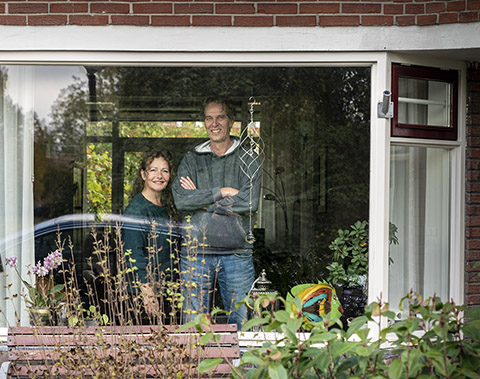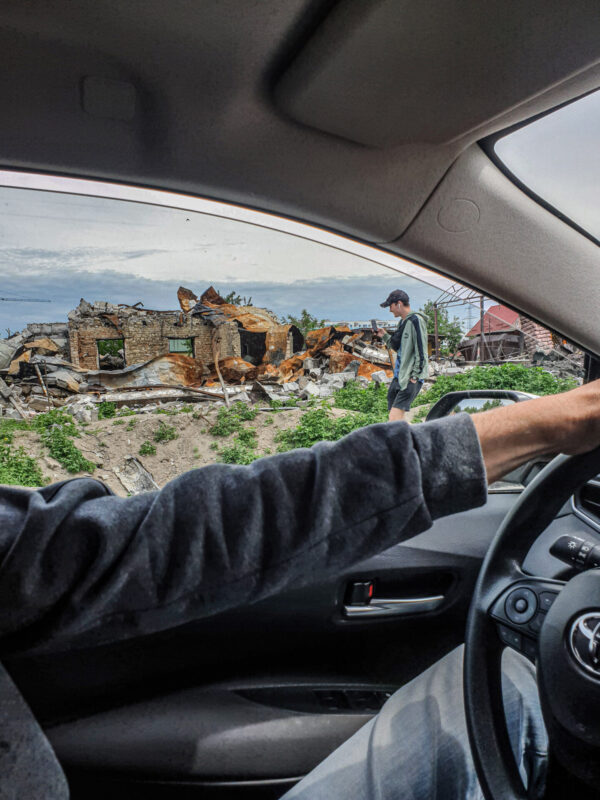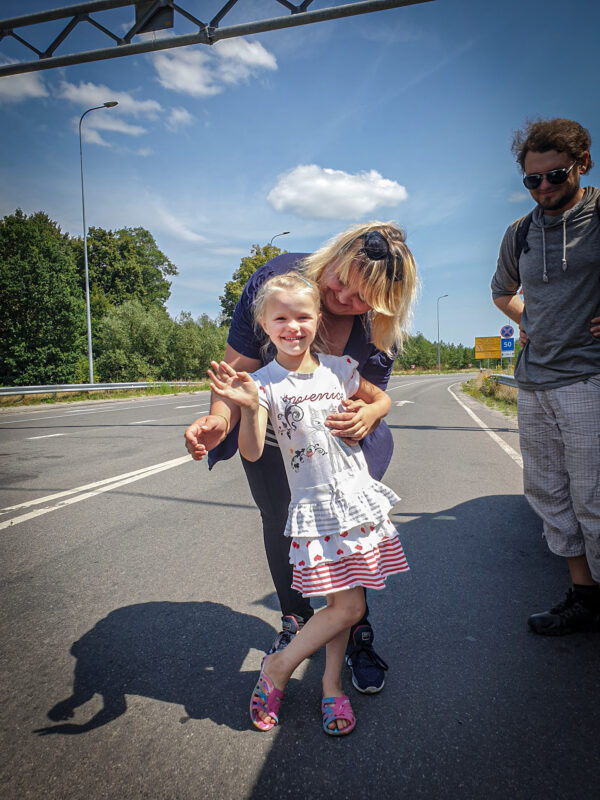
Lack of money keeps Ukraine travellers at home
‘Willingness to donate is decreasing’
There’s a continuous soft static sounding through the living room of Anneke Elzinga and her partner Janscho van Abel. It’s the European shortwave radio. ‘This way we can hear whether bombers from Russia are being launched’, Anneke, front office employee at the arts faculty, says. ‘Because even though for now, she and Janscho have made their last trip to Ukraine, they cannot really let go of the troubles in the country yet.
When she started working as a security guard in the refugee shelter at Ter Apel about thirty years ago, she never would have thought that she’d be driving to a country in war to pick up refugees. Back then she did already feel the anger that is motivating her now. ‘I really felt for the refugees. But I couldn’t help them, couldn’t offer them anything, because that’s a conflict of interest. You’re just not allowed to do anything. By driving to Ukraine, I can get rid of a little bit of that powerlessness.’
Together with Janscho she visited Ukraine seven times. Always in a rented van with stickers of the Red Cross pasted on it. In total, they took about forty people with them to the Netherlands. They always go together. We’re a good team’, Anneke says. ‘I am all about the intelligence, I keep an eye on Twitter, Facebook and the radar for Russian combat flights. Janscho is more of a thinker and decision-maker. And he’s been a professional rally driver, so he can drive really fast too’, she laughs.
Donations
For now, however, those trips have come to a halt. ‘Every trip costs about 1800 euros’, Janscho says. ‘We have to pay for a van and the fuel and of course we also want to offer people a decent place to sleep along the way.’
We want to make sure the money ends up with the right people
Approximately half of the costs are covered by donations from friends, family and other generous donors. The rest is paid by the duo themselves. In addition, they get donations of various items. Hospital equipment from Leeuwarden Medical Centre for example, and hearing protection for the army. Because many Ukrainian soldiers are doing without.

Seeking sponsorship with a large organisation like Giro555 to cover all the costs, is something they cannot do. ‘They only do business with fixed partners,’ Janscho says. ‘And besides, a large part of their money goes to managers and the wrong people. We want to make sure that all the money ends up with the right people. Really counter that corruption.’
Border
Which also means: going ever further into Ukraine to deliver things. ‘At first we only went to the heavily guarded border to pick people up’, Anneke says. ‘We didn’t dare go any further. Besides, the van is not insured at the other side of the border.’
However, the two noticed that around the border traders were operating who wanted to resell the relief goods. And so they decided to deliver the supplies themselves to the hospitals and military personnel, and to also take people along from there. They always went with them across the border to Krakow, and sometimes on to Groningen.
You try to think, chances of a bomb hitting me are very small
The last trip was an urgent one. Anneke and Janscho only got back from Ukraine two days before, when they received a message from volunteer organisation On My Way UA through a WhatsApp group. ‘Asking if we could pick up a six-year-old girl’, Anneke says. ‘A Canadian military brought her out of the occupied area to Kyiv at the risk of his life. Her mother was already in the Netherlands.’

And so they set off for Kyiv again. Every now and then they heard rockets landing in the distance and saw smoke rising in the sky. ‘You try to think, chances of a bomb hitting me are very small. But still we were incredibly relieved when we reached the Polish border on the way back.’
Fuel
Meanwhile, life in Ukraine is going on, Anneke and Janscho noticed. ‘We drank a beer at the terrace of a hotel in Lviv’, Anneke says. ‘A wedding was taking place right next to us. Partying, drinking. People were celebrating as if it was their last day on earth.’
During an earlier trip, they almost ran out of fuel, in the middle of Ukrainian territory. ‘We had already heard that there was a lack of fuel’, Janscho says. ‘And we thought that it wouldn’t be that bad.’ Well, it was. There were long queues for the few gas stations that were still open, people were waiting for days to get ten liters of fuel. ‘That wasn’t an option for us.’
When they left the hotel the next morning, there was a Ukrainian military and his wife sitting next to him. ‘They asked what we were doing there. So we told him we came to evacuate people, but that we were almost out of fuel. The man immediately called his commander. I was told to follow them to a small military gas station. “Fill it up”, they said.’
Wreck
There’s one moment they will never forget, Janscho says. ‘We were the shared owner of a car with a Dutch licence that was at the border in Poland. It was meant to go into Ukraine with, but it was a real wreck. The car already broke down in Lviv, about seventy kilometres across the border. ‘Luckily we were able to rent a car there, but of course we had to turn it in again when we got back in Lviv.’
We bribed the driver for twenty euros
A taxi from the rental company brought Anneke and Janscho to the border with their passenger, a sixteen-year-old girl whose family was already in the Netherlands. They had to walk the last few kilometres to their own car in Poland. ‘That really wasn’t okay’, Anneke says. ‘It was the middle of the night, we had to cross a nasty border with many checkpoints.’
At the last checkpoint, already in Poland, they were stopped. Anneke and Janscho, like the stream of refugees, had to enter a bus. They were to be taken to the registration centre, to be registered. ‘We didn’t want that at all, of course. Our car was three hundred meters away, after the border post. But there was no word against it at first. In the end we bribed the driver for twenty euros. He dropped the three of us off at our car.’
Netherlands
Their work never suffered from the trips to the war zone. ‘Janscho could work remotely, and I was able to take days off’, says Anneke. ‘My supervisor was very flexible. He swapped days in my schedule so I wasn’t immediately scheduled on the Monday after a weekend of travel. And I got donations not only from friends and acquaintances, but also from colleagues.’
But the willingness to donate is waning. ‘When the war broke out, many people reacted emotionally and wanted to help us’, says Janscho. ‘But you do notice that this is changing lately. As a result, it is not financially justifiable for us to go again now.’
The pair are therefore now helping from the Netherlands. They keep in touch with Ukrainians who are housed nearby. If people need things like warm blankets, they visit them. They also collect iodine pills for emergency workers near Zaporizhzhia, Ukraine. This is because if the nuclear power plant located there is damaged, radiation could be released. ‘And the emergency workers in the area don’t have any pills or anything like that right now, so I put out an appeal for that on Facebook.’
Helping from a distance also gives satisfaction, Anneke and Janscho find. ‘But if tomorrow we’re told: here’s a van and five hundred euros, then we’ll go back again.’
After the war, they will definitely go back again. ‘Ukraine is also just a beautiful country. Life there is incredibly basic and simple’, says Anneke. ‘And we have met and helped so many people we can stay with when everything is back to normal. We can go on holiday there for years to come.’